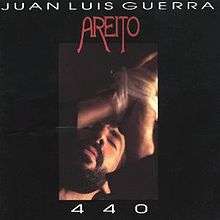Areíto (album)
Areíto is the sixth album by Juan Luis Guerra with his band 440, released in 1992. The album, meant to be a tribute to the indigenous tribes of the Dominican Republic, is named after a dance that the aboriginal inhabitants of the Greater Antilles (taínos) accompanied with songs during their festivals and religious rites. Guerra's songs continued to show a strong influence from African and Aboriginal music. Famous congolese musician Diblo Dibala played guitar in the song "El Costo de la Vida", which was a Spanish cover of his own soukous song "Kimia Eve", while the last track on the album, "Naboria daca, mayanimacaná", is sung in Arawak, the language of the Taíno people. To promote this album he embarked in a 40 date the Areito World Tour in 1993. It Kicked off in July 3 on New York and visited Countries as Brazil, Chile, Argentina, Spain, Mexico, Holland, England and Germany.[3]
| Areíto | ||||
|---|---|---|---|---|
 | ||||
| Studio album by Juan Luis Guerra – 440 | ||||
| Released | December 8, 1992 | |||
| Recorded | 1992 | |||
| Genre | Merengue, Bachata | |||
| Length | 46:19 | |||
| Label | Karem Records | |||
| Producer | Juan Luis Guerra | |||
| Juan Luis Guerra – 440 chronology | ||||
| ||||
| Singles from Areíto | ||||
| ||||
| Review scores | |
|---|---|
| Source | Rating |
| Allmusic | |
| Chicago Tribune | |
Commercial Reception
Billboard stayed "According to Guerra's label, BMG-distributed Karen Records, the new album shipped 400,000 units in the U.S. and 2 million worldwide - one of the largest initial shipments ever for a Spanish -language album.The album was a commercial success across Latin America and Europe. By 1993, the album had sold 850,000 copies worldwide [4][5]. Eventually, it sold 2 millions copies worldwide.[6]
Track listing
- "Areíto" - 1:19
- "El Costo de la Vida" - 4:10
- "Señales de Humo" (Mambo) – 5:32
- "Ayer" (Salsa) – 5:05
- "Frío Frío" - 4:08
- "Rompiendo Fuente" - 4:26
- "Mal de Amor" (Merencumbia) – 3:46
- "Si Saliera Petróleo" (Salsa) – 4:35
- "Coronita de Flores" (Cha-Cha) – 4:17
- "Cuando Te Beso" (Balada) – 3:28
- "Cuando Te Beso" (Bolero) (Bonus Track) – 3:08
- "Naboria/Daca Mayanimacaná" - 2:25
Charts
Weekly Charts
| Chart | Peak
Position |
|---|---|
| Spanish Albums (PROMUSICAE)[7] | 2 |
| Netherlands (Mega Album Top 100)[8] | 67 |
| US Top Latin Albums (Billboard)[9] | 9 |
| US Tropical Albums (Billboard)[10] | 2 |
References
- Allmusic review
- Chicago Tribune review
- Inc, Nielsen Business Media (1993-07-10). Billboard. Nielsen Business Media, Inc.
- "ROCK / Que Guerra sera: Juan-Luis Guerra has opened Dominican music to". The Independent. 1993-03-04. Retrieved 2019-11-30.
- "Guerra: The Hot Tropical Mixmaster". Los Angeles Times. 1993-07-03. Retrieved 2019-11-30.
- "Juan Luis Guerra - República Dominicana Live ! - Biografia, carrera, evolución musical, discos y canciones del artista de merengue Juan Luis Guerra". www.republica-dominicana-live.com. Retrieved 2019-11-30.
- https://worldradiohistory.com/Archive-Billboard/90s/1993/BB-1993-03-13.pdf
- "Juan Luis Guerra – Bachata Rosa". MegaCharts (in Dutch). Hung Medien. 1991-08-10. Retrieved 2011-05-07.
- "Juan Luis Guerra 440 Chart History". Billboard. Retrieved 2019-04-06.
- "Juan Luis Guerra 440 Chart History". Billboard. Retrieved 2019-04-06.